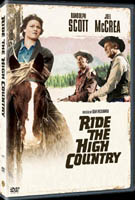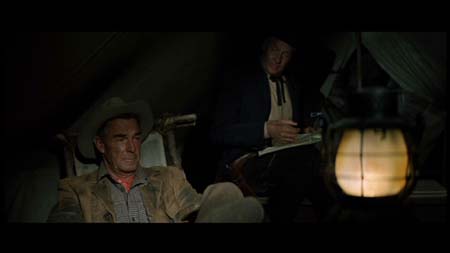 BUY IT AT AMAZON: CLICK
BUY IT AT AMAZON: CLICK
HERE!
STUDIO: Warner Brothers
MSRP: $19.98
RATED: NR
RUNNING TIME: 94 Minutes
SPECIAL FEATURES:
• Commentary by Nick Redman, David Weddle, Paul Seydor and Garner Simmons
• A Justified Life: Sam Peckinpah and the High Country
• Trailers
(This is
part of the brilliant new Sam Peckinpah box set. Get to the other reviews
and the artwork evaluation here, or just go buy
the set from Amazon!)
This
isn’t Sam Peckinpah’s first film, but it’s the first one that matters. After
creating The Westerner (a cool TV
show sadly not yet on DVD) he’d been hired to oversee The Deadly Companions starring
The Westerner‘s Brian Keith. It was
the first of many films to be taken out of his hands, and suffered more
interference than most: Peckinpah wasn’t even allowed to speak to his leading
lady, Maureen O’Hara. That movie is only for the most devoted fan.
This one
is for everyone. I wrote it off for years, thinking it was a late ’50s relic.
With old-guard stars like Randolph Scott and Joel McCrea, I didn’t see how it
could compare to The Wild Bunch. Don’t be as stupid as I was.
The Flick
I almost
started this by saying that this is Sam Peckinpah’s simplest movie. In a way
that’s true. It’s got more ’50s western flavor than anything else he did. And
the story of two old friends who are no longer ideologically aligned is
elemental and almost incredibly pure.
But all
of Peckinpah’s good movies are simple, at least when the plot goes down on
paper. They expand (sometimes to mythic proportions) through small moments and
his devotion to actors. Peckinpah has been called a brute, but his directorial
touch is the gift of life. The most thinly written character leaps to vivid
existence. Almost ironic, for a guy preoccupied with men at the end of their
eras.

I’m getting too old for this shit.
McCrea
and Scott play old friends Steve Judd (McCrea) and Gil Westrum (Scott). Judd’s
got a gig working for a bank; he’s meant to escort gold out of a mountain
mining camp and into town. Looking for help he runs across Gil working as a
carnie cheat, wearing a Wild Bill Hickock wig. Judd signs Gil and his young sidekick
Heck (Ron Starr, who should play bass with a name like that) for the job, little
realizing that they plan to steal the gold. They aim to follow through, even if
they have to go through Judd.
A gold
shipment in danger is about the oldest chestnut in the western playbook. But
you never care about the gold in this film because the weathered faces of Scott
and McCrea are more interesting. Peckinpah’s westerns are about honor, loss and
changing times. These two guys have got sixty years of cowboy experience
between them, and it’s like both of their careers come to a point in this film,
where for once it looks as if the classic dream of the western hero might not
win out.
.jpg)
CGI special editions: officially out of hand.
Compared
to leads in the ’50s white hat westerns, Judd isn’t a perfect hero and Gil is hardly
a personification of evil. He spends the whole movie trying to figure a way to
get the gold with a minimum of damage to Judd, and there are moments where you
think he’ll tip and give the plan up altogether. Gil is as committed to his
path as Judd but their friendship, and the desire for it to last, might be
stronger than the lust for gold.
There’s
more, of course. Elsa, a virtuous preacher’s daughter, entrances Heck. The trio
eventually escorts her to the mountain camp to elope with a miner, much to
Heck’s dismay. The camp is ragged and degenerate. Elsa’s fiancée is one of five
inbred brothers. Their wedding is like Rome come to the west, presided over by
a drunk and the camp madam, a giant redhead with tits big enough for Slim
Pickens to ride to his death.
.jpg)
It’s enough to make a man pine for Arkansas.
The
script isn’t rocket science — it’s just an adventure story about old men —
but it’s brilliantly conceived. Gil and Judd begin their journey suspicious of
one another but quickly find themselves ready to have things the way they once
were. A mutual concern for Elsa and the chaos in
the camp just pull them tighter together. There’s no reason these two shouldn’t
ride together until they die.
Except
gold. While Peckinpah is letting the friendship be reborn, he’s also preparing
to destroy it by showing us Gil’s desire to take the gold, building the film
almost like a thriller. Randolph Scott plays beautifully against type here, showing
a stoic hero gone dark. But we can also see his affection for Judd, which goes
beyond nostalgia. Once huge stars, McCrea and Scott were aging by 1962,
prepared to diminish into the West. They’d never starred together, but their
camaraderie is deep.
The cast
supports them, whether it’s the bewitching Mariette Hartley as Elsa or the
character actors that inhabit the camp. I could list a dozen reasons to I love
Peckinpah’s movies, and near the top is one man: Warren Oates. No one used
Oates like Peckinpah did, and three of his best films are Sam’s. This is the
first. Oates is Henry Hammond, the dirtiest brother-in-law, and he eats the
part up. Peckinpah lets him go, but only to the brink of overacting; never
past. Peckinpah regular L.Q. Jones also shows up as one of the Hammonds.
.jpg)
As a young man, Odin just liked birds.
Further
touches of honesty come from unexpected sources. Elsa’s wedding may be run by a
drunk Judge, but when it comes time to give the vows, he slips into a moment of
clarity to deliver a message about compromise in marriage. It could be played
for laughs but the moment is honest and moving. Peckinpah saves the chuckles for
a minute later, when Elsa’s new brothers-in-law all try to get a kiss. The
comedy is as queasy as the Judge’s speech was sober.
The
film’s only notable flaw is the music. The title theme is perfect, but many of the cues are hideous. The music was added after Peckinpah
had left the film, and he reportedly hated it.
Compared to
what was done to some of the director’s other movies, the score is a minor
blemish. This is just a great movie. It created Peckinpah’s theatrical career
and capped those of the two stars. Randolph Scott knew he couldn’t go out on a
better note and retired; Joel McCrea made only a handful of movies afterward.
They couldn’t ask for a better farewell than this.
9.1 out of 10
The Look
I was
afraid that this movie would look like roadkill, since it’s almost been buried
for a while, but this disc looks fantastic. There are a couple of tiny motion
artifacts, but the color, detail and contrast are all spiffy.
8 out of 10
The Noise
The sound
is as good as the image, which can bite you in the ass, given how lame some of
the music is. There are a few sweeping cues that might have been meant for Oklahoma!
instead of a small story about friendship and loneliness. They sound great in
this mix, which makes the fact that they don’t fit even more obvious. Still, I
can live with that.
8 out of 10
The Goodies
Filmmaker
Nick Redman moderates the commentary with Peckinpah biographers Paul Seydor,
Garner Simmons and David Weddle. These guys know their stuff, and you can tell
that they do love watching the film. But they’re scholars and encyclopedias,
and the track gets pretty dry. If you’re patient for detail there’s a lot, but
don’t expect it to sound like Guillermo del Toro.
A Justified life: Sam Peckinpah
and the High Country is
interesting because it was made with the involvement of Fern Leah Peckinpah,
Sam’s sister. After having read the three books written by the gents on the
commentary, she’s a character in her own right, and I enjoyed listening
to her tell the family story. The men in Peckinpah’s line were judges and
congressmen, and their sense of honor and responsibility are one hundred per
cent to credit or blame for the way he saw the world. This might be too much of
a family picture book for a lot of people, but I appreciated the inclusion.
There are
also trailers for this film, The Wild Bunch, Cable Hogue, The Getaway and Pat
Garrett, as well as (for no good reason) all of Warners’ James Dean movies.
7 out of 10
Overall: 9 out of 10